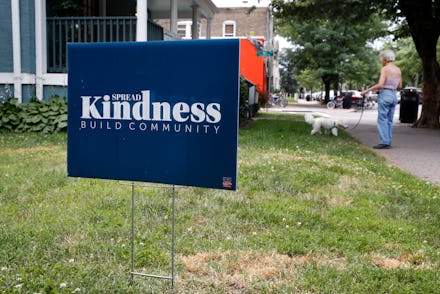Scalise shooting has left and right condemning heated political rhetoric, but we've seen this before

Has our political rhetoric gotten too heated?
In the wake of the Alexandria, Virginia, baseball practice shooting that left Rep. Steve Scalise (R-La.) critically wounded, some in politics and the media are calling for a cooldown.
"I think, as a whole, our country certainly could bring the temperature down a little bit," deputy White House press secretary Sarah Huckabee Sanders said Thursday, the day after James T. Hodgkinson, a 66-year-old former Bernie Sanders volunteer, opened fire on the Republican baseball team as they practiced for the Congressional Baseball Game.
This echoed a sentiment expressed by MSNBC host Joe Scarborough, who earlier Thursday said that the "heated rhetoric in this country has to calm down," and Wall Street Journal columnist Peggy Noonan, who warned Friday of the dangers of political "rage."
To the right, the Alexandria shooting was the product of "violent rhetoric" on the part of Democrats — and even, as Rep. Steve King (R-Iowa) suggested, the fault of former President Barack Obama, who King said "contributed mightily to dividing us." Meanwhile, Democrats shot back that one need look no further than the man occupying the White House, President Donald Trump, to find unhinged political rhetoric. Indeed, Trump's political career has been characterized by his impulsive, hostile language and has included direct calls for violence.
So potent is our political anger and so intense are our divisions that some observers suggested that America may be "the most polarized it’s ever been in our history."
Is that true?
Not exactly, according to Harvard University historian Timothy Patrick McCarthy.
"This is a country that was founded through violence, nearly undone through violence and that continues to have a problem with violence. That's been a through line of American history," McCarthy said in an interview. "You see violent rhetoric at every turn. It may be referencing different things, but you see violent rhetoric throughout American history."
In 1856, Sen. Charles Sumner (R-Mass.) gave a fiery speech on the Senate floor in which he called for Kansas to be admitted to the Union as a free state, saying that allowing slavery there would constitute the "rape of a virgin territory" and attacking his colleagues, Sen. Stephen A. Douglas (D-Ill.) and Sen. Andrew Butler (D-S.C.).
Two days later, Rep. Preston Brooks (D-S.C.), Butler's cousin, walked up to Sumner's desk in the Senate chamber and beat the Massachusetts Senator unconscious with his cane.
McCarthy said he frequently employs this story to remind people that political anger and division is nothing new — and that it has been worse than it is now.
"You won't see Lindsey Graham do that to Elizabeth Warren," McCarthy joked. "That's not going to happen."
But that the vitriol in today's political climate is nothing new does not make it any less troubling.
Jennifer Mercieca, associate professor of communication at Texas A&M University and director of the nonpartisan Aggie Agora on civic engagement, said that Americans have been conditioned to be "partisans first and citizens second," and that our discourse is "as bad or worse than its ever been."
"Every person with social media is their own propagandist now," Mercieca said in an interview. "It's not even just political parties or political actors, but anyone who considers themselves a partisan. We're all propagandists."
Still, while there is a "relationship" between political rhetoric and the kind of violence that erupted in Alexandria on Wednesday, it is not necessarily a "causal relationship," McCarthy said.
According to McCarthy, rhetoric considered "heated" has been part of movements for social change, such as the abolition movement and the civil rights movement.
Further, McCarthy cautioned against a "false equivalency" between the rhetoric on the left and the rhetoric on the right. A New York Times feature Tuesday hypothesized that the attack might "prove to be an unexpected test" for Sanders' populist movement, and CNN's Wolf Blitzer got into a heated exchange with Jane Sanders on Thursday over whether or not her husband had gone too far when he labeled Trump the "worst and most dangerous president in the history of our country."
"To blame Bernie Sanders for [Wednesday's] shooting at the Republican baseball practice is at the very least a huge stretch," McCarthy said. (Sanders condemned Hodgkinson on Wednesday, saying that "real change can only come about through nonviolent action.")
"That's categorically different than [Trump] talking about 'Second Amendment solutions,'" McCarthy added, referring to comments that then-candidate Trump made at a rally in August that were seen by many as a potential threat against his opponent, Hillary Clinton.
Mercieca, who is studying Trump and writing a book about demagogues, believes that Trump's rhetoric is driven by a failure to think of others — particularly his political opponents — as people.
For her, that's where improving the state of our national discourse begins: with being more "thoughtful and humane" in our political engagement. But people don't need to let go of their justified anger or frustration to do that, Mercieca said.
Charles M. Blow wrote in defense of rhetoric in his Times column Thursday, writing that, "while rhetoric should never promote violence, it needn't be timid."
"It is true that political rhetoric can set a tone that greases the skids for a small number of people who are prone to violence to act on those impulses," Blow wrote. "But some rhetoric is necessary and real. I believe Donald Trump and the Republican-led Congress are attempting to do very serious harm to the country and its most vulnerable citizens, and I will never stop saying so in the strongest terms I can summon."
"You can, as I do, have sympathy for the victims of yesterday's shooting and condemn the shooter, while at the same time raging, nonviolently of course, against an agenda that places other Americans in very real danger," he continued.